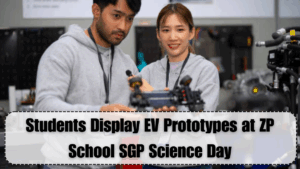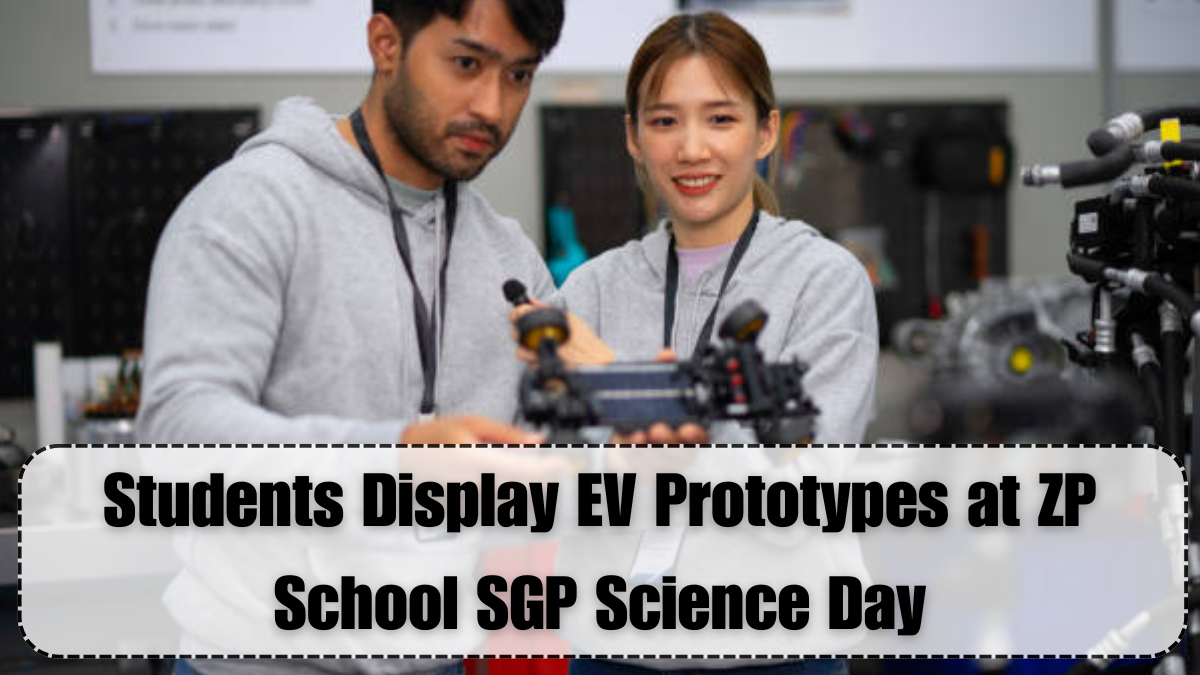EV tech demo day lit up the Zilla Parishad School SGP campus during its annual science exhibition, as students unveiled a wide array of electric vehicle prototypes and green energy charging models. In a vibrant celebration of science, sustainability, and student innovation, the school transformed its classrooms and playgrounds into mini research labs where children showcased their knowledge of electric mobility and renewable energy.
More than 200 students from Classes 6 to 10 participated in the event, presenting self-built EV models made from recyclable materials, functional circuits, and solar-based charging systems. Parents, local officials, science educators, and engineers from the nearby polytechnic college attended the exhibition, turning the school science fair into a full-scale community engagement activity.

Real-World EV Projects by Students
The highlight of the EV tech demo day was the interactive gallery of student-led projects that included working models of electric bikes, mini solar charging stations, EV control panels, and even regenerative braking simulators. Each project was built by student teams with guidance from teachers and local mechanics.
Key projects displayed during the event included:
-
A scale-model of an electric bus powered by a solar panel
-
A functional miniature EV with battery-to-wheel transmission
-
A student-made wind turbine charging dock for small EVs
-
Smart helmet with battery status indicators
-
Recycled plastic EV body designs
These exhibits showed not just creativity but a clear understanding of basic mechanical and electrical engineering concepts.
Encouraging Innovation Through Hands-On Learning
Unlike textbook theory, the school science fair allowed students to physically build and test their ideas. Teachers incorporated the demo day preparations into their regular science lessons, turning the classroom into a workshop for two months leading up to the event. The projects helped reinforce EV concepts such as battery storage, motor torque, and clean energy inputs.
The EV tech demo day became a platform for:
-
Collaborative learning across grades
-
Peer-to-peer mentoring on circuit design
-
Confidence building through public presentation
-
Recognition of future innovators in electric mobility
This real-time learning boosted engagement and inspired students to consider further study or training in green technologies.
EV Models Built with Local Resources
What made the event even more impressive was that all EV models were constructed using affordable, locally available materials—plastic bottles, discarded motors, cardboard, and scrap electronics. This frugal innovation approach made it accessible for every student, regardless of economic background.
The focus was not on perfection, but on participation and problem-solving. Several students also used solar panels from home lighting kits and bicycle wheels to simulate real-world EV chassis. These DIY solutions made the models both educational and practical.
Community Participation and Recognition
The EV tech demo day drew attention from nearby schools, local authorities, and environmental NGOs. Some of the top-performing teams were invited to present their work at the Taluka-level science and sustainability summit. Certificates and medals were distributed to all participants, with special mentions for innovation, teamwork, and presentation.
Parents shared overwhelmingly positive feedback, noting how their children now talk about electric vehicles, battery waste, and solar energy at home. The school science fair proved to be more than an academic event—it became a conversation starter for sustainability within families and the village community.
FAQs
What is EV tech demo day at ZP School SGP?
It is a science exhibition where students build and present working EV models and green energy solutions as part of their practical science curriculum.
Who participated in the school science fair?
Students from Classes 6 to 10 participated, guided by science teachers, with support from local engineers and community members.
What kind of EV models were displayed?
Projects included miniature electric bikes, buses, solar-powered chargers, and self-designed battery-operated vehicles using recycled parts.
Was this event open to the public?
Yes, the EV tech demo day welcomed parents, local leaders, and nearby schools, making it a highly inclusive community event.
What did students gain from participating?
They gained hands-on experience, presentation skills, exposure to EV engineering basics, and encouragement to explore electric mobility careers in the future.
Click here to know more.
